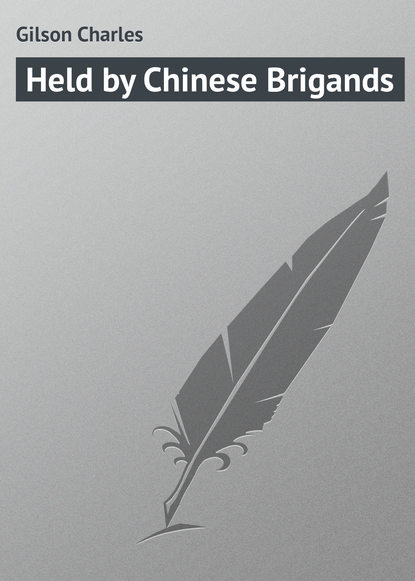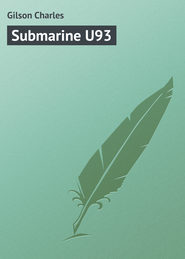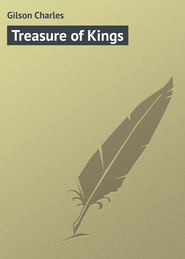По всем вопросам обращайтесь на: info@litportal.ru
(©) 2003-2025.
✖
Held by Chinese Brigands
Настройки чтения
Размер шрифта
Высота строк
Поля
Frank, looking down, beheld a subterranean chamber, about five yards by six in area, and not more than six feet deep-for Ling's head and shoulders protruded above the level of the ground. And in this vault were sacks, to the number of twenty, each of which was filled with a thousand Mexican dollars.
Now a thousand silver dollars are no mean weight; and yet Ling unaided, and in spite of his fast-failing strength, lifted the sacks one after another and placed them upon the ground above.
Then he himself came forth from the vault, and stood for a moment holding his left side, with the pale moonlight full upon his face. It was the face of death itself.
The man's features were more drawn and haggard-looking even than before. It may have been the moonlight that caused his countenance to appear snow-white. He breathed like one who is spent from running; his great chest heaved, and Frank perceived that his wound had opened again, and the red blood was even then staining his clothes. Towards this man-of whom, throughout all the adventures through which he had passed, he had stood in the greatest dread-the boy now experienced feelings of infinite commiseration.
"Let me help you?" he asked.
And Ling laughed aloud-a laugh that sounded forced and hollow, in which there was more of irony than mirth. He pointed to one of the bags.
"Lift that up," said he.
Frank attempted to do so, but found that he had not the strength.
"You must go back to the junk," said he. "I give you my word of honour I will be true to you. I will attend to your wound. I will do all I can to help you."
"You do not know me," answered Ling. "I never give in. I go through with that which I have begun. And besides, there is no time to lose. I feel sure that Yung How has not wasted his time. If I delay I may be captured."
"If you do not rest," cried Frank, "you will kill yourself."
Ling was silent a moment. Then he snapped his fingers. "And what does that matter?" he asked. "What difference does it make to you-or, for the matter of that, to me? Death is nothing. We are only put into the world to die."
At that he lifted one of the bags upon his shoulder, and set forward in the direction of the place where the junk was moored.
CHAPTER XXVII-HOW LING DRIFTED TO THE STARS
Ling staggered under the weight of his burden. For all that, he gained the junk, where he threw the sack into an open hatchway in the forepart of the ship.
He then returned to the glade, and by a great effort lifted a second sack upon his shoulder. In all, he made the journey twenty times; and on each occasion his gait was more unsteady, his breathing shorter and faster. It appeared to Frank, who watched him, that the man diminished in stature; his shoulders became round-when he had once been so upright-and he walked like an old man, with bent knees and hollowed chest.
He was not able to complete his final journey without a rest. Half-way between the glade and the junk, he threw down the last sack upon the ground, and seating himself upon it, placed his head between his hands and came out with a great sob that was pitiful to hear. He needed his last ounce of strength to steady himself to walk the narrow gangway. No sooner had he reached the deck of the junk than the sack fell from his hands, and he himself collapsed. His knees gave way from under him, and he lay for several minutes quite motionless, curled up like a great dog that sleeps.
Frank, thinking that the man was unconscious, knew not what to do. He began to search for a tin can or pannikin of some sort in which to give him water, but he had failed to find anything suitable for such a purpose when Ling struggled to an elbow.
"Come here," said he. "I would speak to you."
His voice was so low as to be scarcely audible. Frank hastened to his side and, kneeling down, placed an ear close to his mouth.
The boy had no fear now of the mighty Ling. Indeed, it would have been mere foolishness to fear one so stricken, in so sorry a plight. Ling was no longer an incarnate monster, a blustering, boisterous bully. The tiger was caught, choked and enfolded in the meshes of a net. And yet, he still struggled for life-struggled to the last.
He was a man who, during the last few hours, had been possessed by but one idea, which had absorbed the whole of his mind and strength and energy. Call it avarice, greed of gold, or the nobility of a supreme endeavour, it is all the same-it means that there was something in him of the earthly hero. It means that a power that is immortal had given him strength to accomplish all that he desired, had given him courage to live but a little longer. And now, with the plunder safely on board, and the wide river of the valley extending to the open sea, he knew that his days were numbered, his time on earth was short.
"I would speak with you," he whispered. "I would tell you, you are my friend. Go below and release the European prisoners, but keep Cheong-Chau's men bound hand and foot. You cannot trust them. They are all of a breed-of the same breed as their leader. In Canton-if you wish it-you can hand them over to justice. Tell the prefect that they were captured by the mighty Ling."
In that thought he appeared to find some degree of satisfaction. He had always been vain of his strength, his wisdom and his courage.
He was silent a moment. Frank noticed that he smiled-a smile that was terrible to see, because his face was so pinched and haggard. His thoughts must have turned to things divine, for when he spoke again, it was in the words of the Celestial Emperor's prayer. He had turned over upon his back, and lay with his eyes wide open, looking up at the stars.
"To Thee, O mysteriously working Maker, I look up in thought. How imperial is Thy expansive arch! I, Thy child, dull and unenlightened, come to Thee with gladness, as a swallow rejoicing in the spring, praising Thine abundant love."
All his vanity had left him now. The heart of the monster was that of a little child. The violence of the life he had lived, the cruelty of his deeds, departed from him as the life's blood flowed from his wound; and the wisdom and the reverence he had learned on earth rose superior to earthly joys. He closed his eyes, and lay for a long time, breathing more easily, as if asleep.
Frank got to his feet and, descending into the cabin below, cut the bonds that bound Mr Waldron and his uncle. In as few words as possible, the boy explained exactly what had happened; and then all three went on deck, to the place where Ling was lying at the foot of the mast.
As they approached, he endeavoured to lift his head, but it fell back again, as if he had lost control of the muscles of his neck.
"Can you sail the junk?" he asked, speaking for the first time in English.
"I think so," said Frank. "In any case, if we can but get her out into mid-stream, she will drift upon the current."
"That is what I would wish," said Ling. "Let me drift into the other world. Forty years since, I was born upon the turbulent waters of the Hoang-Ho. Let me breathe my last upon the tranquil Pe-kiang. One is inclined to believe," he continued, "that destiny is expressed in symbols. The Hoang-Ho is the most boisterous, violent and unmanageable river in all the thirteen provinces of this celestial land. And my life has been such, in very truth. I have lived by violence, and now I die a death by violence. But-I know not why-I die calmly, in peace with all men and my Maker. I think that, perhaps, the bad that was within me has gone out of me with the brute strength that was mine, and the good that was within me has taken possession of my soul, to conduct me to the expansive arch of heaven. And now, that I may rest in peace, bring me a pillow for my head. You cannot move me-I am too heavy. Besides, I desire to remain here, to regard the stars."
Searching the junk, they found several cushions, and these they disposed so that the man could lie in greater ease. And Mr Waldron, who-as a man who had lived much of his life in the wilds-had some little experience in surgery and medicine, attended to Ling's wound, washing away the blood and folding another and a cleaner bandage.
And then they loosed the junk from her moorings, and with difficulty at last succeeded in getting the ship clear of the creek. She at once swung round with the current. And when they lowered what little canvas she carried, the ship drifted down the river, with Sir Thomas Armitage at the tiller.
On this account progress was very slow, and they had not progressed many miles when the red dawn began to appear in the east. They passed villages upon both banks of the river, surrounded by flooded ricefields, purple in the dawn. As the light grew, they were able to perceive distant wooded hills, with ancient temples and pagodas built upon their slopes.
They had taken turn and turn about at the work of steering, relieving one another every half-hour, so that there were always two of them in attendance upon Ling. He did not speak again until the sun had risen, when he complained that the light was trying to his eyes.
As he had said, he was far too heavy to be moved. They constructed an awning above him, a small sail tied to the mast. He thanked them with Chinese courtesy, and then closed his eyes again, as if he desired to sleep.
A little after, they rounded a bend of the river, and found that they had gained the Pe-kiang, or North River, which joins the West River a little above Canton. And there, lying in mid-stream, like a watch-dog at the mouth of its kennel, was a British gunboat, her paint glistening in the sun, the great muzzle of a 4.5 gun directed at the bows of the junk. They could see the gunners, each man in his place, standing ready to fire.
The junk drifted nearer and nearer to the man-of-war. They could see the commander on the bridge. He shouted to them through a megaphone, ordering them to heave to and drop their anchors, or else he would open fire. When he saw that there were Europeans on board, however, who were free to do what they liked, and that the only Chinaman visible was a man stretched at full length upon the deck beneath an awning, he threw back his head with an exclamation of surprise.
At the commander's side upon the bridge stood a long-coated Chinaman; and as the junk drew alongside, Sir Thomas and his nephew recognised their old servant, Yung How.
A moment later, the lieutenant-commander was on board the junk, listening in astonishment to the extraordinary tale which Frank Armitage had to tell. It was not easy to believe, but there was on board the junk indisputable evidence that the boy spoke the truth. For there was the sack of silver dollars upon the deck, where Ling had thrown it; Cheong-Chau's seven men were below, bound hand and foot; and there was the great Honanese himself, with the spark of life no more than glimmering in that colossal frame.
Whilst Frank was relating his story, Sir Thomas addressed himself to Yung How, who stood upon the deck of the gunboat. The man explained that he had done all in his power to atone for his treachery and ingratitude. He had reached Hong-Kong-as we know-on the same boat as the letters, but had not been able to pluck up sufficient moral courage to present himself before the police authorities until after he had been several hours on the island. The ransom had already been despatched, when the Chief of Police presented himself before Sir John Macintosh, the Governor.
It would have been easy to telegraph to Canton, instructing those on board the launch to wait for His Majesty's gunboat Ferret. It was decided, however, to allow the ransom money to be taken over by the brigands, who could afterwards be brought to book at the junction of the Sang River with the Pekiang. It would not be possible for Cheong-Chau to remove the treasure by any other means than by junk orwupan. Of the operations of Ling and the undoing of Cheong-Chau and his band, the Hong-Kong police authorities, of course, knew nothing.
Yung How himself was ordered to accompany the ship's doctor, who immediately hastened to the assistance of the dying man on board the junk. When the servant found himself face to face with his master, he immediately fell upon his knees, imploring Sir Thomas to be merciful. The judge was not slow to forgive, realising that Yung How had at last been made to realise the evils of the drug to which for so many years he had been a slave, and the depths of degradation to which the opium smoker can sink.
Upon that fateful morning, however, beyond a few brief words of mutual congratulation, little enough was said. The attention of all was taken up by the prostrate figure of the notorious Canton robber, who for years past had defied all authority and law.
The naval surgeon declared that he could do nothing. The man was already as good as dead. The surgeon's sole cause for wonderment was that Ling still lived.
The great Honanese remained insensible until the moment when Cheong-Chau's brigands were brought on deck. Then, opening his eyes, he looked at them, at first not appearing to remember who they were. Then, very slowly, a smile spread upon his face.
"They go the way of all men," said he; "to the Potter's Yard, if evidence can be produced against them; at all events, to the wooden cages that are to be found at the gates of the city. As for myself, I go before a greater court of justice. And I am not afraid."
He remained silent for a moment, and then, seeing Frank, he asked the boy to come to him.
"Had I not met you," said he, "that morning on the wharf at Sanshui, perhaps I should not now be bidding farewell to all my earthly troubles. Still, that is a matter of no importance. I would like to thank you, because you have been true to me. It does not flatter me to think that you preferred me to Cheong-Chau. You obeyed me in the first instance through fear, and then because you saw that I was one upon whom you could rely. Tell me, is that so?"









